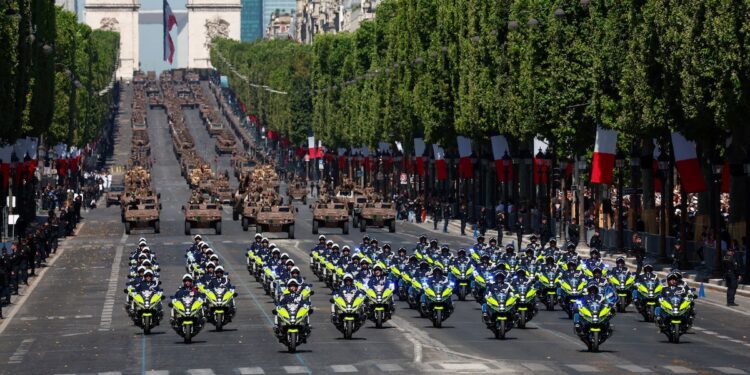As France prepares to commemorate its national holiday today, July 14th, millions of citizens across the country will gather to celebrate Bastille Day, a date that forever changed the course of French history and embodies the nation’s enduring commitment to liberty, equality, and fraternity.
The festivities began at dawn with the traditional military parade along the Champs-Élysées, where President Emmanuel Macron reviewed troops while crowds lined the famous avenue. France is set to celebrate its national holiday with the usual fireworks display as well as light drawings made with the help of drones, marking a modern twist on age-old traditions.
But behind the pageantry lies a story of revolution that began 236 years ago on this very date. French National Day is the anniversary of the Storming of the Bastille on 14 July 1789, a major event of the French Revolution, as well as the Fête de la Fédération that celebrated the unity of the French people on 14 July 1790.
The Bastille fortress, originally built in the 14th century as a royal castle, had become a symbol of royal authority and oppression by the late 18th century. Used primarily as a state prison, it housed political prisoners and represented the arbitrary power of the monarchy. On that fateful summer morning in 1789, amid economic crisis and growing social unrest, angry Parisians marched toward the fortress demanding gunpowder and arms.
Its storming on July 14th, 1789, marked a turning point in the French Revolution, representing the people’s uprising against oppression and the demand for freedom and justice. Though only seven prisoners were found inside, the symbolic act of tearing down the fortress walls resonated throughout France and beyond. The fall of the Bastille became the clarion call for revolution, inspiring the famous rallying cry “Liberté, Égalité, Fraternité” that would define the French Republic.
The event marked the beginning of the end for absolute monarchy in France. King Louis XVI’s divine right to rule was challenged by citizens who demanded representation, fair taxation, and basic human rights. The revolution that followed would reshape not only France but inspire democratic movements across Europe and the Americas.
For modern French citizens, Bastille Day represents far more than a historical commemoration. It embodies the ongoing struggle for democratic values and social justice. The holiday serves as a reminder that freedom must be actively defended and that citizens have both the right and responsibility to hold their government accountable.
Bastille Day signifies freedom, democracy, and nationhood, continuing to resonate with French people who view the holiday as a celebration of their republican values and national identity. The annual festivities reinforce the social contract between the French state and its citizens, emphasizing that sovereignty ultimately rests with the people.
Today’s celebrations will conclude with spectacular fireworks displays across the country, illuminating the sky in the tricolor of the French flag. From the Eiffel Tower to village squares throughout the nation, French citizens will gather to honor the legacy of those who stormed the Bastille and forever changed the meaning of citizenship and democracy.
As France faces contemporary challenges in the 21st century, Bastille Day remains a powerful reminder of the transformative power of collective action and the enduring importance of defending democratic principles. The revolutionary spirit of 1789 continues to inspire new generations of French citizens to uphold the values of liberty, equality, and fraternity that define their republic.

















